During the special event at GPU Technology Conference 2022, along with their new GeForce 40 series cards, Nvidia announced “Portal With RTX.” A modern remaster utilizing and showcasing the real-time ray tracing capabilities of new GeForce 4080 & 4090 cards. As beautiful as it was, there are many technical marvels Nvidia managed to pull off with the introduction of Ada Lovelace architecture. Today in this Portal With RTX review, we will not tell how good this 2007’s puzzle-platform game is. Well, the game is considered among the best of all time. We will look at how Nvidia achieved the impossible task of making it modern in every way possible. So let’s get started.
So What is “Portal with RTX”?
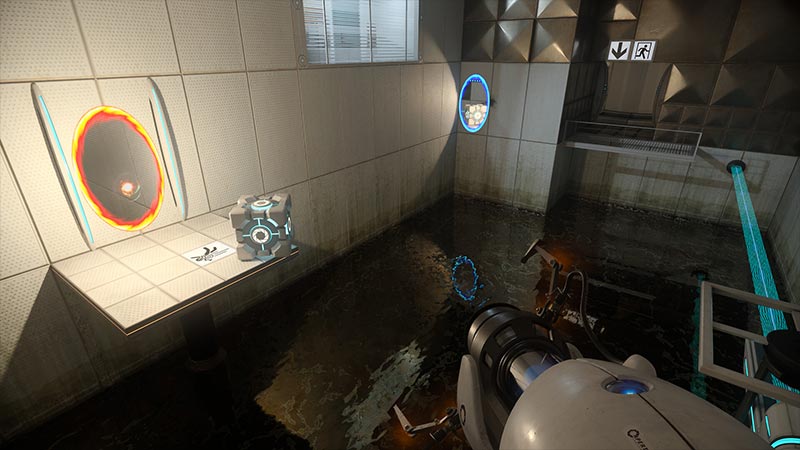
Portal with RTX is a free DLC by Nvidia Lightspeed Studios for owners of the original game on PC. The new DLC reimagines the classic game’s graphics with complete ray tracing, remastered hi-res physically based textures, and enhanced high-poly 3D models to accompany everything. Apart from these, the Nvidia mixed in the magic of DLSS 3 and Reflex to get both buttery smooth framerates, & pinpoint accuracy to place your portals.
Since Portal’s original release back in October 2007 as part of Valve’s “The Orange Box” bundle, Nvidia GPUs have come a long way. I remember playing on my “GeForce 7300 GT” and enjoying the additional 10-15 framerates once I upgraded to a “GeForce 8600 GT”.
The funny part is, in my brain, ‘what I think Portal looks like’ is how it looks now with RTX. I imagined it with all FX in-game lights, running with smooth FPS in my head. But now firing up my old PC showed me the difference has been like day and night.
Playing on new GeForce 40 series cards with real-time ray tracing & DLSS 3 has blown me away. It’s everything you saw in the trailers, but being in the game, from the voice of GLaDOS, looking at enhanced Weighted Companion Cubes, and finally listening to “Still Alive” during credits, makes you fall in love with the game all over again.
How Did Nvidia RTX Remix Change Portal?
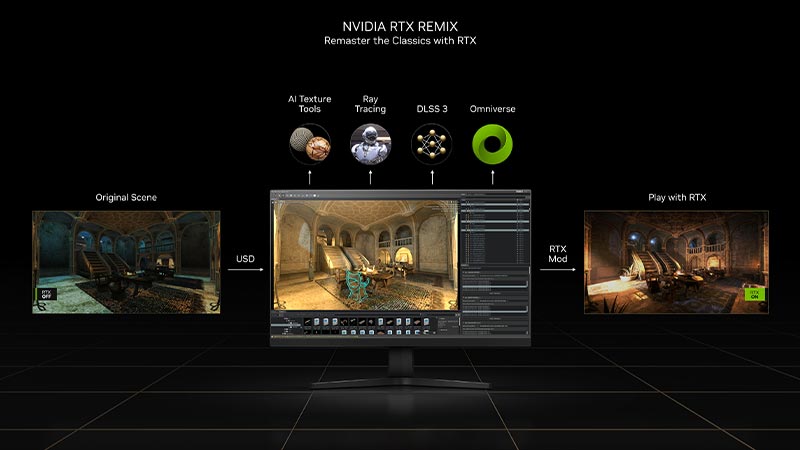
The main highlight of the experience is undoubtedly the “Nvidia RTX Remix” modding platform. Being part of Nvidia Omniverse, this tool allows modders to add RTX for any compatible classic game they like. Apart from complete ray tracing, modders can add enhanced materials, NVIDIA DLSS 3 and NVIDIA Reflex, to games.
In Portal RTX, the hotkey is “Alt+X.” Press the hotkey, and you can modify various parameters like DLSS quality to the number of reflected lights in a scene. To recreate an exact scene from the original game, RTX Remix can understand the textures, geometry, lighting, and cameras and translate them into separate elements. Each texture and surface must have physically-based rendering (PBR) materials when assets are remastered for ray tracing for them to interact with light realistically. Glass, for instance, reflects the environment with exemplary clarity and reflections in “Portal with RTX.”
Regarding upgraded assets, RTX Remix uses AI to streamline and speed up the art remastering process. By up to 4X, AI Super Resolution boosts the captured textures’ resolution, converting previous HD textures into better 4K formats.
However, as vintage games were developed in an era before sophisticated lighting systems, they frequently relied on intangible lighting sources to illuminate locations. Thus, textures and models are only one aspect of the remastering process. Ray tracing may relight a scene with softer, more realistic shadows because of RTX Remix’s ability to transform old lights into realistic ones.
With RTX Remix, Nvidia instantly added cutting-edge ray-traced and physically-based elements to a vintage game like Portal from 2007. “Portal with Rtx” has blazing energy globs, thousands of tiny LEDs, reflective water surfaces, futuristic lit buttons, boards on every floor, and dynamic lighting in in-game areas. With the new RTX GPUs, all of this may now be rendered in real-time with the help of DLSS, making your gameplay possible without worrying about resources or performance caps. Compared to previous games and what is currently achievable with screen space technologies, this combination of ray tracing technologies results in extraordinarily accurate ray tracing, equal to modern AAA titles.
All New Portal RTX Upgrades
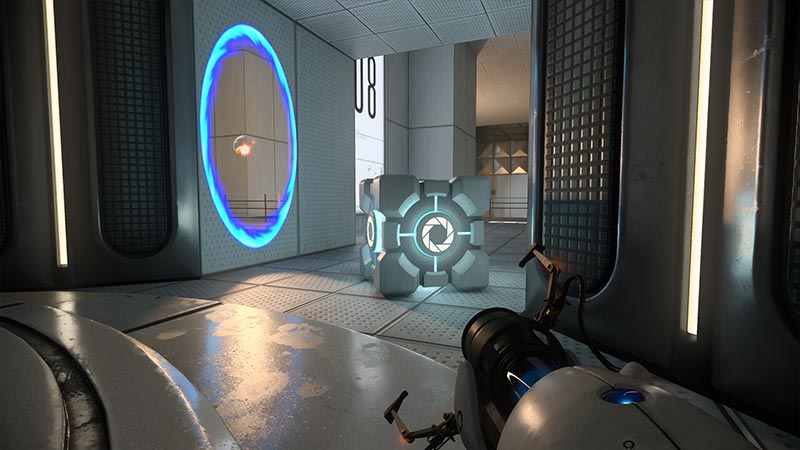
NVIDIA provides significant advancements in ray tracing with new GPUs this year. You can observe how much a single frame can be delivered by a specialized ray tracing core. Now that NVIDIA has included the usage of the RT Cores and again used DLSS on the Tensor Cores, you can play games at a speed that is very astonishing when compared to earlier versions.
NVIDIA RTX is the most cutting-edge platform for ray tracing and AI technologies, which are transforming how we play and create. To produce realistic visuals with lightning-fast speed or cutting-edge new AI technologies like NVIDIA DLSS and NVIDIA Broadcast, over 250 popular games and applications employ RTX. The new norm is RTX.
Ray tracing, which mimics how light interacts in reality, is unleashed in all its splendor by the NVIDIA Ada Lovelace architecture. Thanks to the brilliance of GeForce RTX 40 Series and third-generation RT Cores, you may enjoy stunningly realistic VR content unlike ever before.
How does DLSS 3 Improve Portal?
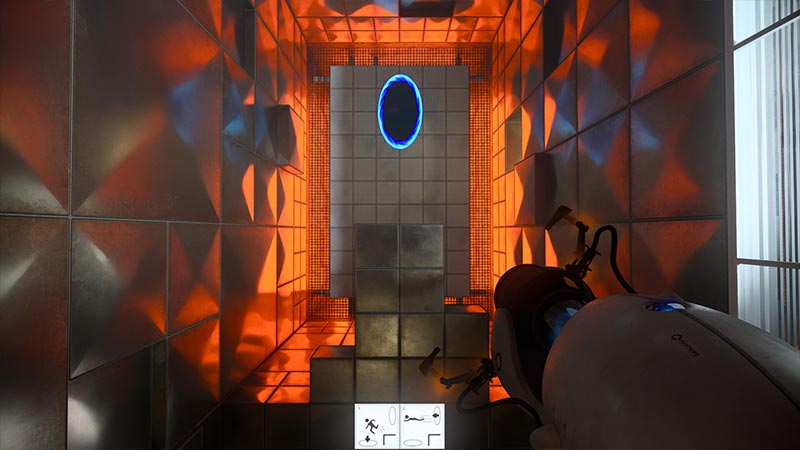
The innovative advancement dramatically increases performance in AI-powered graphics known as DLSS. DLSS 3 employs AI to produce extra high-quality frames and is supported by the new fourth-generation Tensor Cores and Optical Flow Accelerator on GeForce RTX 40 Series GPUs.
A new generation Optical Flow Accelerator (OFA) found in Ada Lovelace generation RTX GPUs is used by DLSS 3.0. The new OFA outperforms the OFA that was previously built into Turing and Ampere RTX GPUs in terms of speed and accuracy. As a result, the RTX 4000 Series is the only one that supports DLSS 3.0.
DLSS 3 uses an optical-flow frame creation method to enhance DLSS 2.0. The DLSS frame creation technique creates a new frame that seamlessly transitions between two generated frames from the rendering process. As a result, one extra frame is produced for each displayed frame.
It improves performance by producing more frames using AI. DLSS examines consecutive frames relevant to the new Optical Flow Accelerator in GeForce RTX 40 Series GPUs to produce more high-quality frames.
By employing artificial intelligence to produce higher-resolution frames from lower-resolution inputs, DLSS 3 increases efficiency for all GeForce RTX GPUs. To rebuild native-quality pictures, DLSS samples several lower res image data. And then incorporates motion information & feedback from earlier frames into them.
With more than 200 games and applications already using DLSS, including popular independent titles like Deep Rock Galactic and major AAA titles like Cyberpunk 2077 and Marvel’s Spider-Man Remastered, the technology is revolutionizing the video game industry.
Portal with RTX Verdict
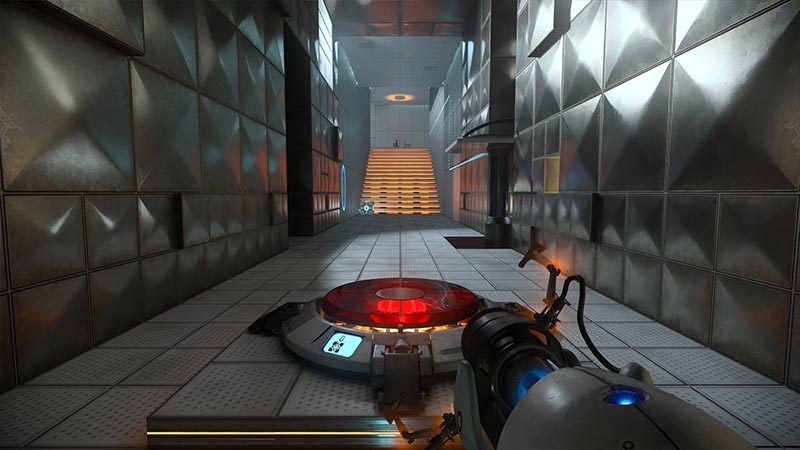
There never has been a better time to go back to Portal again with this new free DLC. Nvidia Lightspeed Studios made the dream of every die-hard Portal fan come true. And the true king of everything behind the show is Nvidia RTX Remix. Modding an old game to meet new-age graphic technologies has never been this easy. But yes, the Nvidia team managed to pull this off. With all the technologies mentioned above, Portal’s new DLC is the beauty. You only need a beasty RTX 40-series card to get the best of it.
Portal with RTX DLC managed to eloquently combine both DLSS 3, & Reflex, to bring the visual capabilities of the base game on par with any modern AAA title. Make sure to get your hands on the latest RTX 40-series GPUs to get the full benefit of DLSS 3 and enjoy all the latest games at its full eye-candy reflections & smooth framerates. Considering everything, including how awesome the base game was before the new DLC, we have to give a full 10/10 for “Portal With RTX” in this review. A game you must play on new RTX cards.

